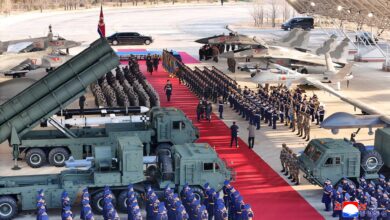On September 7, Juche 78 (1989), Kim Il Sung received Piore, chief of the Beijing bureau of Italian Radio and Television.
He informed President Kim Il Sung that his bureau had produced the feature-length documentary Korea–Mystery and Glory, and that he was planning to write a novel about the President’s anti-Japanese armed struggle. He asked the President to tell him about his activities among the masses in the early period of his revolutionary career.
Kim Il Sung said that the masses of the people are the motive force of the revolution, and success or failure in the revolution depends on how they are awakened and trained. He paused for a while as he recollected his past with deep emotion, and carried on: I frequently went to the rural areas in those days; as there were many illiterates in the countryside, I made a point of learning how to write a funeral oration and how to write for others.
He said:
“Whenever I was asked by the peasants to write a funeral oration, I would agree. I also knew how to work as scrivener. A scrivener should know how to write a letter of complaint or accusation, or an affidavit to bring a lawsuit against someone. In the olden times such legal documents had their own unique style of writing. Documents not written in the proper style were rejected.”
As far as funeral orations were concerned, the President told the story of something that had happened a long time before. The story went as follows:
Once, while conducting activities in a rural village together with a few young communists including Cha Kwang Su and Kye Yong Chun, he was lodging at a farmhouse.
One day he returned to his lodging from work at around midnight.
As he entered the courtyard, Cha Kwang Su and Kye Yong Chun, who had been sitting under the eaves waiting for him, rushed out to him in delight.
Kim Il Sung asked them why they hadn’t gone to bed. Cha Kwang Su told him the reason.
When Cha Kwang Su and Kye Yong Chun had finished dinner, their host had asked them,
“Sirs, tomorrow is the day of the memorial service for my grandparents. We’ve prepared a ceremonial altar. If you could write the funeral orations, we will perform the ancestral rites at dawn tomorrow.”
Cha Kwang Su readily agreed to the request. But, to his regret, Cha knew nothing about writing funeral orations; he supposed that Kye would know, but he, too, was ignorant.
The situation was very awkward.
In the kitchen the ceremonial altar was already arranged; the host’s family were eagerly waiting for the funeral orations.
Kye Yong Chun was making things difficult for Cha Kwang Su, complaining that he had told a lie and so threatened to ruin the ancestral rites.
“Oh, my God, I never dreamed that I would get into such trouble on account of my poor knowledge of funeral orations.”
Saying this, Cha Kwang Su gave a heavy sigh.
At that moment Kim Il Sung entered.
Kim Il Sung laughed heartily, asking how Cha Kwang Su and Kye Yong Chun could be confounded by such a trifling matter as funeral orations. He said in a pleasant voice that he would work for them and they should reward him generously in return for his service.
Kim Il Sung wrote the funeral address, and the memorial service proceeded smoothly.
After the ancestral rites, the host brought them a pile of rice-cakes as a token of his gratitude for the funeral address.
Kye Yong Chun was all smiles, saying that he was being treated to the rice-cakes thanks to Kim Il Sung.
But Cha Kwang Su looked at him seriously and said:
“Comrade Kye, both you and I are still little prepared for the revolution. Had we not written a funeral address today, what would have happened? This is not a simple matter for those who have set out on the road of revolution. Let us draw a lesson from this. We should bear in mind that we should have versatile talents, so that we can go among the people.”
Concluding the story, Kim Il Sung said: Cha Kwang Su was right in what he said. Revolutionaries should know everything if they are to go among the people; versatile knowledge is as good as a ticket for a train bound for the people.

